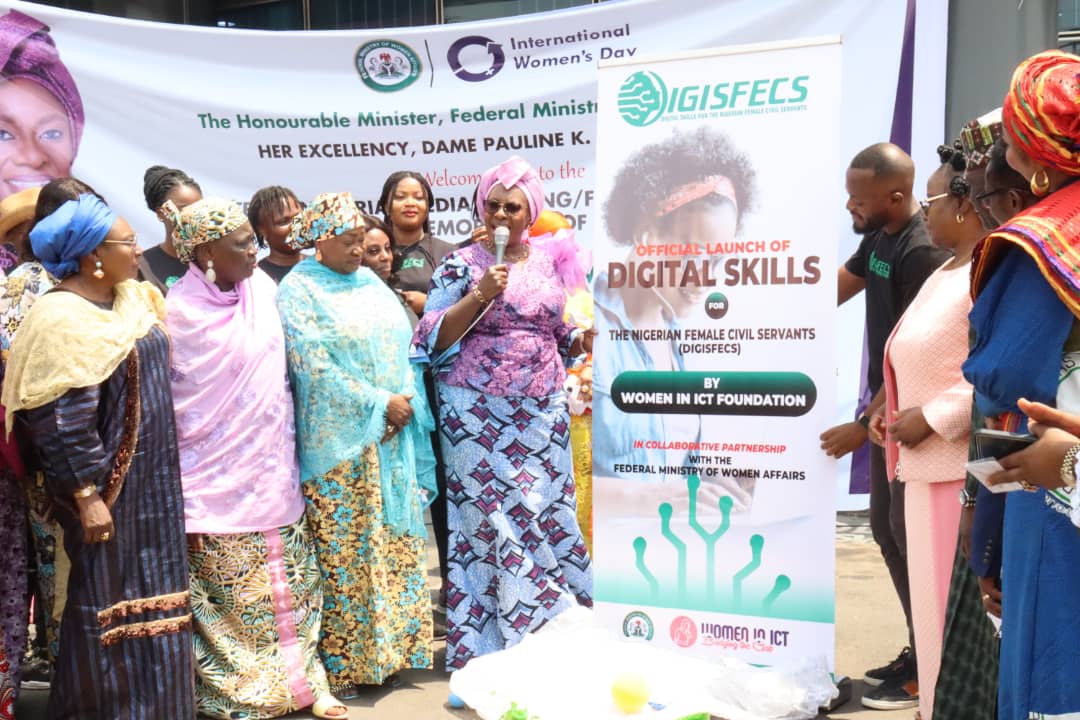Maureen Okpe
Minister of Women Affairs and Social Development, Dame Pauline Tallen has called for the adoption of women and girls participation in science, technology, engineering and mathematics (STEM) courses to create room for gender advancement and national development.
Tallen, made the call in Abuja, at a media briefing ahead of the commemoration of the 2023 International Women’s Day (IWD) celebration, with a theme “DigitALL: Innovation and technology for gender equality”.
She noted that, bringing women and other marginalised groups into technology has greater potential for innovations that meet women’s needs and promote gender equality.
The minister stressed the need for gender-responsive approach to innovation, technology and digital education that can increase the awareness of women and girls regarding their rights and civic engagement.
“Teachers and educational institutions be supported to consciously remove gender biases and stereotypes in our educational environments, textbooks and didactic materials.
” It starts with making women’s contributions to STEM visible, including through connecting young women and girls with STEM professionals and mentors.
“Their lack of inclusion, by contrast, comes with massive costs and according to the UN Women 2022 Women’s Snap Short Report, women’s exclusion from the digital world has reduced one trillion dollars from the gross domestic product of low- and middle-income countries in the last decade.
” This loss will grow to $1.5 trillion by 2025 without action.
“Reversing this trend according to the report will require tackling the problem of online violence, which 38 per cent of women had personally experienced,” she said.
UNFPA Country Representative, Uller Mueller harped on the role technology plays to expand networks, opportunities, and minds.
Mueller, represented by UNFPA Deputy Representative, Erika Goldson however, noted that technology was increasingly misused and weaponised, with women and girls disproportionately targeted.
” This can take the form of image-based abuse, sextortion, harassment, hate speech, cyberbullying and doxing.
” Data tells us that 97 per cent of girls between 11 to 16 years in Nigeria have experienced unwanted sexual approaches in chat rooms, social networking sites or emails.
” 7.89 per cent of this group have been sent sexual images or content, 57 per cent of women have had their videos or images online abused or misused,” she said.
She added that UNFPA was developing safety and ethics guidelines for practitioners designing technology for gender-based violence prevention and response and engaging technology companies to involve women in design processes from the outset.
” Technology is essential to advancing gender equality. When women and girls can access and use technology safely, they can amplify their voices and exercise their agency and autonomy – giving them a platform that can transform their future – and ours,” she said.
UN Resident Coordinator, Marthias Schumale, pledged the UN would enhance involvement of women and girls in technology to increase gender inclusion.
He said, ” We will continue to invest into technology. And as we do that we will prioritise women and girls because collectively we can make the world of technology and innovation inclusive by working together.”
Also, Prof. Ibrahim Pantami, Minister of Communications and Digital Economy, represented by Mrs Iklima Musa, Special Assistant to the DG on Strategy and Innovation said they would train 200 women on ICT and digital economy in March 6-8, to reduce the gender gap in technology innovation.
Highlight of the event was the announcement of ICT Training for 1500 Women and a demonstration of “Smart Bra” by “Women In ICT in Nigeria”. The innovative Bra could detect breast cancer if at early stage.

